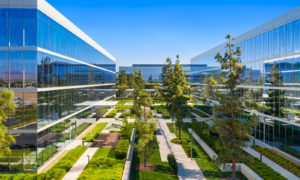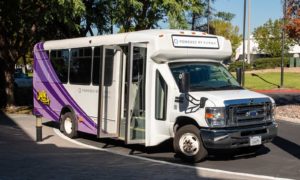Progress is revving up at Rivian, the Irvine-based company that makes the sleek electric SUVs and trucks we’re seeing everywhere. Last year, the company secured a $5.8 billion investment through a joint venture with Volkswagen. This year, it’s taking reservations for the long-awaited R2, a midsized, more affordable SUV to be delivered in 2026.
Last month, Rivian opened a showroom at Spectrum Center where visitors can check out models, take a test drive and explore a curated selection of branded merchandise ranging from key fobs to coffee grinders and camp kitchenware to dog harnesses.
“We’ve been through a lot of twists and turns since I founded the company in 2009, but I’m happy to say we’re really starting to gain some traction,” says RJ Scaringe, Rivian’s CEO. Scaringe discusses his reasons for optimism.
Why is Irvine the right place for Rivian?
We’re really happy with Irvine as a core center of product development for us. It’s a great place to live and a great place to recruit to. There’s a tremendous amount of talent here, which creates a critical mass in which businesses follow the talent, and then talent follows the businesses. Irvine also has a lot of other innovative high-tech companies doing really interesting things here, not necessarily all in transportation, which creates an environment of synergy from the friendship circles that evolve.
What does the VW deal mean for Rivian?
It’s a major step forward. It will help create more compelling EV choices for consumers, which deeply aligns with the mission of our business and is why I started the company.
What does this year hold in store?
We’re incredibly excited about the launch of our R2 SUV. We’ve expanded dramatically recently as we’ve prepared to launch this much-lower-priced but super-cool product early next year.
EVs account for less than 1% of cars on the road in the U.S. Do you still believe that in 25 years it will be rare to see a gas-powered car?
Unequivocally. The user experience is so much better. Customers prefer EVs once they have them. The challenge today is we’re still in the very beginning. There’s not a lot of customer choice, and we still need to build out the charging infrastructure. But the technology is moving quickly in terms of charging speeds. Consider that in California and 11 other states, by law, in 2035 you won’t be able to buy a gasoline-powered car. This will be positive for the U.S. economy because it’s the way to the future. Imagine in the 1900s if you said, “Horse sales are still strong; I want to just continue investing in horses.” We would have lost this huge amount of business that was created within the U.S.









